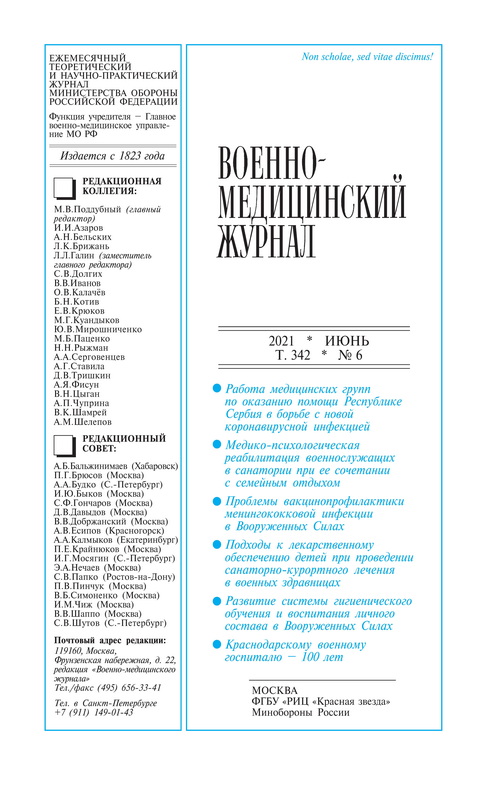Проблемы вакцинопрофилактики менингококковой инфекции в Вооруженных Силах
- Авторы: Жданов К.В1, Захаренко С.М1, Иванов К.С1, Козлов К.В1, Ляшенко Ю.И1, Сидоренко С.В2, Мартенс Э.А2, Башкирев А.А3, Шарабханов В.В1
-
Учреждения:
- «Военно-медицинская академия имени С.М.Кирова» МО РФ
- «Детский научно-клинический центр инфекционных болезней Федерального медико-биологического агентства»
- «Белгородский государственный национальный исследовательский университет» Минобрнауки России
- Выпуск: Том 342, № 6 (2021)
- Страницы: 36-42
- Раздел: Статьи
- URL: https://journals.eco-vector.com/0026-9050/article/view/82619
- DOI: https://doi.org/10.52424/00269050_2021_342_6_36
- ID: 82619
Цитировать
Аннотация
Ключевые слова
Полный текст
Об авторах
К. В Жданов
«Военно-медицинская академия имени С.М.Кирова» МО РФ
Email: zhdanovkv@rambler.ru
член-корреспондент РАН, профессор, полковник медицинской службы Санкт-Петербург, Россия
С. М Захаренко
«Военно-медицинская академия имени С.М.Кирова» МО РФдоцент, полковник медицинской службы Санкт-Петербург, Россия
К. С Иванов
«Военно-медицинская академия имени С.М.Кирова» МО РФпрофессор, генерал-майор медицинской службы в отставке Санкт-Петербург, Россия
К. В Козлов
«Военно-медицинская академия имени С.М.Кирова» МО РФдоктор медицинских наук, доцент, подполковник медицинской службы Санкт-Петербург, Россия
Ю. И Ляшенко
«Военно-медицинская академия имени С.М.Кирова» МО РФпрофессор, полковник медицинской службы в отставке Санкт-Петербург, Россия
С. В Сидоренко
«Детский научно-клинический центр инфекционных болезней Федерального медико-биологического агентства»профессор Санкт-Петербург, Россия
Э. А Мартенс
«Детский научно-клинический центр инфекционных болезней Федерального медико-биологического агентства»Санкт-Петербург, Россия
А. А Башкирев
«Белгородский государственный национальный исследовательский университет» Минобрнауки Россииг. Белгород, Россия
В. В Шарабханов
«Военно-медицинская академия имени С.М.Кирова» МО РФкапитан медицинской службы Санкт-Петербург, Россия
Список литературы
- Азаров И.И., Бутаков С.С., Шпунтов А.А. Обеспечение санитарно-эпидемиологического благополучия в Вооруженных Силах Российской Федерации в 2017 году // Эпидемиология. - 2018. - Т. 298, № 1. - С. 15-19.
- Грицай М.И., Королева М.А., Фомкина Н.Н. и др. Эпидемиологическая характеристика менингококковой инфекции в Москве // Эпидемиология и вакцинопрофилактика. - 2019. - Т. 19, № 2. - С. 56-62.
- Есипов А.В., Шкловский Б.Л., Паценко М.Б. и др. Случай аденовирусной инфекции, осложненной грамотрицательным полимикробным сепсисом: клинико-морфологическое наблюдение // Тер. арх. - 2015. - № 11. - С. 92-96.
- Жданов К.В., Иванов К.С., Захаренко С.М. и др. Менингококковая инфекция: ранняя клиническая диагностика и неотложная помощь // Воен.-мед. журн. - 2015. - Т. 336, № 1. - С. 29-35.
- Королева М.А., Миронов К.О., Королева И.С. Эпидемиологические особенности генерализованной формы менингококковой инфекции, обусловленной Neisseria meningitidis серогруппы W, в мире и в Российской Федерации // Эпидемиология и инфекц. болезни. - 2018. - № 3. - С 16-23.
- Крюков Е.В., Савушкина О.И., Малашенко М.М. и др. Влияние комплексной медицинской реабилитации на функциональные показатели системы дыхания и качество жизни у больных, перенесших COVID-19 // Бюл. физиологии и патологии дыхания. - 2020. - № 78. - С. 84-91.
- Махнев М.В., Махнева И.Ю. Менингококковая инфекция в Военно-морском флоте: современные клинико-эпидемиологические аспекты // Воен.-мед. журн. - 2004. - Т. 325, № 10. - С. 49-59.
- Методические рекомендации по профилактике, диагностике и лечению менингококковой инфекции в Вооруженных Силах Российской Федерации: Методические рекомендации. - М.: ГВМУ, 2018. - 78 с.
- О состоянии санитарно-эпидемиологического благополучия населения в Российской Федерации в 2018 году: Государственный доклад. - М.: Федеральная служба по надзору в сфере защиты прав потребителей и благополучия человека, 2019. - С. 145-146.
- Фридман И.В., Харит С.М. Профилактика менингококковой инфекции // Медицинский совет. - 2017. - № 4. - С 16-18.
- Шарабханов В.В., Жданов К.В., Захаренко С.М. и др. Менингококковая инфекция: клинико-эпидемиологическая характеристика в современных условиях // Вестн. Рос. воен.-мед. акад. - 2018. - Т. 64, № 4. - С. 186-191.
- Шарабханов В.В., Жданов К.В., Захаренко С.М. и др. Течение генерализованной формы менингококковой инфекции у пациента призывного возраста, отказавшегося от специфической профилактики (клинический случай) // Журн. инфектологии. - 2020. - Т. 12, № 2. - С. 161-168.
- Audry M., Robbe-Masselot C., Barnier J.-P. et al. Airway Mucus Restricts Neisseria meningitidis Away from Nasopharyngeal Epithelial Cells and Protects the Mucosa from Inflammation // mSphere. - 2019. - Vol. 4, N 6. - P. 1-17.
- Bai X., Borrow R., Bukovski S. et al. Prevention and control of meningococcal disease: Updates from the Global Meningococcal Initiative in Eastern Europe // J. of Infect. - 2019. - Vol. 79. - Р. 528-541.
- Caugant D.A., Hоiby E.A., Magnus P. et al. Asymptomatic carriage of Neisseria meningitidis in a randomly sampled population // J. Clin. Microbiol. - 1994. - Vol. 32, N 2. - P. 323-330.
- Mustapha M., Marsha J. W., Krauland M.G. et al. Genomic Epidemiology of Hypervirulent Serogroup W, ST-11 Neisseria meningitidis // EBioMedicine. - 2015. - Vol. 2. - P. 1447-1455.
- Neal K.R., Nguyen-Van-Tam J.S., Jeffrey N. et al. Changing carriage rate of Neisseria meningitidis among university students during the first week of term: cross sectional study // BMJ. - 2000. - Vol. 320. - P. 846-849.
- Riordan T., Cartwright K., Andrews N. et al. Acquisition and carriage of meningococci in marine commando recruits // Epidemiol. Infect. - 1998. - Vol. 121, N 3. - Р. 495-505.
- Sidorenko S., Zakharenko S., Zhdanov K. et al. Observational study of nasopharyngeal carriage of Neisseria meningitidis in applicants to a military academy in the Russian Federation // International J. of Infect. Diseas. - 2019. - Vol. 81. - P. 12-16.
Дополнительные файлы







